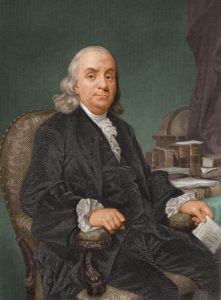This Week in History: January 15 – 21
The Democratic Party donkey symbol makes its first appearance.
By: Kelli Ballard | January 15, 2023 | 771 Words

(Photo by Mark Makela/Getty Images)
“I’ve been completely fascinated with history because it tells everything about what’s going to happen next because it’s cyclical, everything repeats in general.” ~ Emile Autumn
January 15, 1870: The Democratic Party Gets Its Donkey Symbol
Have you ever wondered why the Democratic Party is symbolized by a donkey and the Republican Party with an elephant? What was meant as a joke, an insult even, has become the images we associate with the political parties today.
Andrew Jackson, while on his presidential campaign in 1828, started the first known instance of the donkey. Jackson, who is considered the first Democrat, was regarded as a stubborn mule and called names by his opponents. A hero of the War of 1812, the soon-to-be-president was amused by the names and decided to use the donkey image in his campaign posters.
But it wasn’t until January 15, 1870, that the donkey image was publicly recorded and associated with the Democrats. Political illustrator Thomas Nast drew his cartoon, which appeared in Harper’s Weekly. It was meant as an insult to the party, but the Democrats instead associated the animal with strength and adopted it as a sort of mascot and symbol.
The Republican Party was formed in 1854, and Abraham Lincoln became the first member to be elected to the White House. The elephant symbol represented an expression during the Civil War. “Seeing the elephant,” often said by soldiers, meant seeing combat. But, just as with the donkey, the elephant didn’t get notoriety until Nast used it in the same publication, Harper’s Weekly, in 1874.
Today, the donkey and the elephant are easily recognized and associated with their respective political parties. What was meant as an insult became a beacon of identity and pride within the political arenas.
Other Notable History Mentions
January 15, 1535: Henry VIII became Supreme Head of the Church in England.
January 15, 1559: Elizabeth Tudor was crowned as Queen Elizabeth I. She was the daughter of Henry VIII and Anne Boleyn.
January 16, 1547: Ivan the Terrible had been ruling Russia since 1533 but officially crowned himself as the first Russian Czar on this day. Although he brought some great reforms, he was also a cruel leader.
January 16, 1991: Allied aircraft organized an air raid against Iraqi air defenses, beginning the Iraq war.
 January 16, 1992: The Civil War in El Salvador ended by signing a peace treaty. It had lasted 12 years.
January 16, 1992: The Civil War in El Salvador ended by signing a peace treaty. It had lasted 12 years.
January 17, 1773: Captain James Cook crossed the Antarctic Circle in his ship Resolution, becoming the first to do so.
January 20, 1936: King George V died at 71 years old. He was the grandson of Queen Victoria. To break ties with the German line of descent in his family, he renamed his line the House of Windsor.
January 21, 1954: At Groton, Connecticut, the world’s first nuclear powered submarine, the USS Nautilus, was launched.
January 21, 1976: Passengers were able to ride the Concorde supersonic jet for the first time at twice the speed of sound (Mach 2) from London to Bahrain and from Paris to Rio de Janeiro.
Famous Birthdays
Martin Luther King (January 15, 1929) was born in Atlanta, Georgia. A civil rights leader, he received the Nobel Peace Prize in 1964.
Andre Michelin (January 16, 1853) was born in Paris, France. In 1888, he started the Michelin Tire Company.

Benjamin Franklin (Photo by Stock Montage/Getty Images)
Benjamin Franklin (January 17, 1706) was born in Boston, Massachusetts. An inventor, he was also considered the Elder Statesman of the American Revolution and was a signer on the Declaration of Independence and the Constitution.
Muhammad Ali (January 17, 1942) was born in Louisville, Kentucky as Cassius Clay and went on to become a boxing superstar.
Daniel Webster (January 18, 1782) was born in Salisbury, New Hampshire. A politician, in 1830 he told the Senate “Liberty and Union, now and forever, one and inseparable” after southern senators claimed individual states could choose to refuse to obey Congress.
Robert E. Lee (January 19, 1807) was born in Westmoreland County, Virginia. He was a military leader of the Confederacy during the Civil War.
Edgar Allen Poe (January 19, 1809) was born in Boston, Massachusetts. A poet and writer, he told tales of mystery and suspense. Some of his works includes The Raven and The Fall of the House of Usher.
Ethan Allen (January 21, 1738) was born in Litchfield, Connecticut. Considered a hero of the Revolutionary War, in 1775, he led troops that captured Fort Ticonderoga in New York without any bloodshed.
Thomas “Stonewall” Jackson (January 21, 1824) was born in Clarksburg, Virginia. He was a general in the Confederate Army during the Civil War. He got his nickname because he held firm when others faltered at the battle of Bull Run. One general said, “There is Jackson standing like a stone wall.”
















